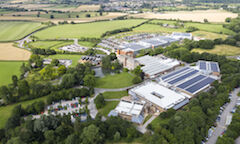After first committing to a net zero pledge by no later than 2050 in November 2021, Global engineering technologies company, Renishaw, has now announced further targets to reduce its greenhouse gas emissions and overall impact on the environment across its global sites. The company has now announced plans to reduce scope one and two emissions by 90 per cent by 2028 and quantify scope three emissions by March 2023. Thecompany’s newly appointed sustainability team will continue the progression the company has already made towards its targets, as well as working to educate employees about how they can think more sustainably and working with stakeholders, like its supply chain, to better understand their environmental impact.
The UK manufacturing sector is increasingly focused on sustainability, with almost a third of FTSE100 companies making net zero pledges after COP26. Renishaw has aligned its sustainability development with the United Nations Sustainable Development Goals, such as responsible consumption and production. Its net zero target will be validated and monitored by the Science Based Target initiative, an international body that promotes best practice in emissions reductions, to ensure the business’ goals are in line with recognised climate science.
Renishaw is already making clear steps towards its net zero target with 80 per cent of its total electricity use now coming from renewable sources. Renishaw will also continue to increase its renewable electricity generation across its sites globally, and is investigating options, including solar , wind and hydro. It has also reduced the amount of waste that has made its way to landfill, with just nine per cent of global waste ending up in landfill in the 2021 financial year.
Life cycle assessment is one of the focuses for Renishaw as it reduces its carbon footprint. Its life cycle assessment specialist will look at quantifying and reducing the carbon footprint of the products Renishaw creates. This process will help Renishaw’s customersachieve their own emissions targets by providing clear data and reporting on the carbon impact of each component and the circularity of the product once it has reached end of life. Life cycle assessment will also take a large role during product development stages by helping the research and design teams about sustainable design principles, lower carbon material alternatives, and lower energy manufacturing processes.
“Renishaw still has a long way to go before it fully understands how to achieve its net zero targets,” explained Ben Goodare, Head of Sustainability at Renishaw. “With the expert support of my team and the cultural drive for sustainability throughout the business, we are placing ourselves in a good position to achieve our net zero targets by 2050, at the latest.”
For further information about Renishaw’s sustainability targets, visit the website https://www.renishaw.com/sustainability.

